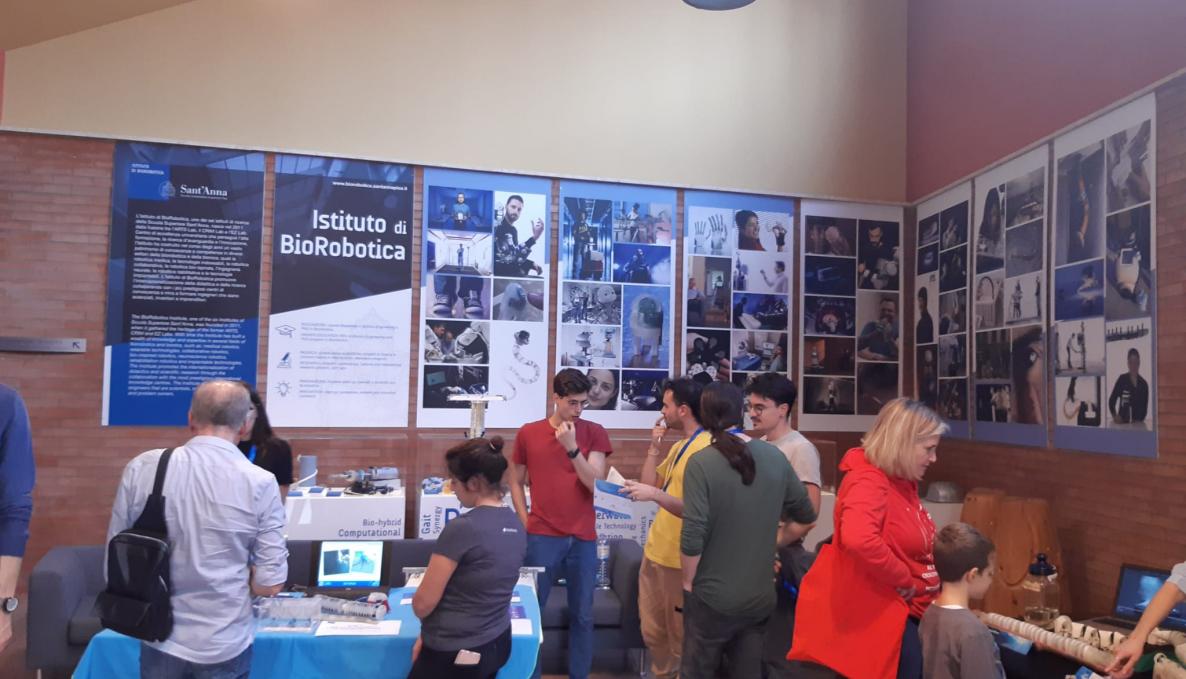San Faustino Open Day, the BioRobotics Institute of Sant'Anna School opens the doors of its laboratories for a day of scientific dissemination

Research is at home in Pontedera thanks to San Faustino Open Day, the traditional event repeated every year on the occasion of the festivities for the city's patron saint. The Polo Sant'Anna Valdera, headquarters of the BioRobotics Institute of Sant'Anna School, opens its laboratories to the public for a day dedicated to research and scientific dissemination.
From 3 p.m. to 6 p.m., the laboratories of the BioRobotics Institute and the Center for Material Interfaces of the Italian Institute of Technology will show visitors (free entrance, no reservation required) recent research activities in the fields of biorobotics, soft robotics, surgical robotics, artificial organs, and the fight against climate change through the use of sustainable technologies.
The planned initiatives
Guided tours of the Institute's research areas, workshops for children, poster sessions and meetings with researchers on some of the most innovative frontiers of scientific research. These are the initiatives scheduled during the San Faustino Open Day. The four conferences address projects conducted by the Institute of BioRobotics and future challenges of great importance for scientific research.
The programme of the lectures is as follows:
- 15.00 "Towards a bioinspired larynx" by Jasmine Pozzi, PhD student: The larynx is one of the smallest but also one of the most complex organs in the human body and home to the vocal cords. Any alteration of this organ can eliminate one or more of its functions with numerous physical and social problems for the person. The lecture presents the first steps towards the creation of the artificial organ starting with the study of the larynx of different animal classes to find basic structures and movements.
- 15.30 "A soft robot for the food industry'" by Niccolò Pagliarani, PhD student: What is the level of collaboration between workers and robots in the food industry? The lecture explores the future of robotics in the food industry and the new perspectives that the introduction of soft robots opens up for handling fragile objects such as fruit and mushrooms.
- 16.00 "This changes everything: what science tells us about the past, present and future of climate" by researcher Alberto Mazzoni: How serious is the current climate change? What are the causes? And what can we do to adapt and above all slow it down? We find the most reliable answers in the periodic reports of the IPCC (Intergovernmental Panel on Climate Change), a body made up of hundreds of the best climatologists from all nations, already awarded the Nobel Prize in 2007. The presentation will focus on the latest IPCC report, in its three parts: causes and prospects of climate change, adaptation strategies, and mitigation strategies. Finally, we will present studies on the link between global warming and extreme weather phenomena such as the recent dramatic floods in Emilia Romagna and Libya.
- ore 16.30 "Forces in the Cellular Universe: Mechanobiology in Action" by Davide De Luca, PhD student: a lecture exploring the interactions between cellular mechanobiology and space, analysing how studies carried out in microgravity can provide information to develop new prevention and treatment strategies also on Earth.
The 'Space Changes You' exhibition
There will also be the multimedia exhibition 'Space Changes You' by Prof. Debora Angeloni, an immersive journey on the extreme adaptation of human cells in space.
San Faustino for kids!
Numerous initiatives dedicated to young visitors. Four paths are planned in the programme: 1. Discovering the superpowers of small animals to build better robots (activities such as observing the locomotion of snails and various small insects on smooth and vertical surfaces); 2. How to build bionic devices that use the metabolism of micro-organisms and organic waste to generate clean electricity; 3. Demonstrations of robotic fish and their components to understand the "ingredients" needed to make an autonomous robot 4. Choose your own temporary tattoo created for you by the LAMPSe lab.



